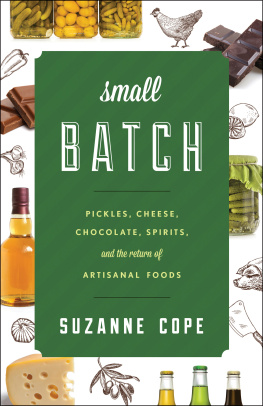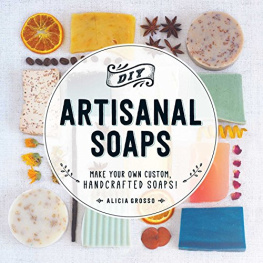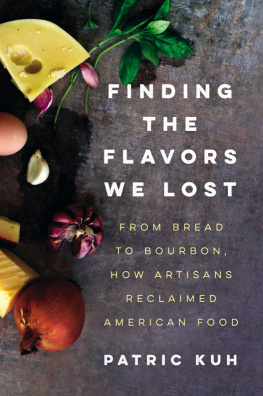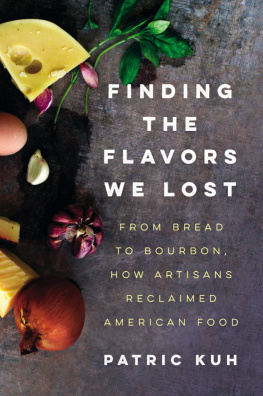Small Batch
Rowman & Littlefield
Studies in Food and Gastronomy
General Editor: Ken Albala, Professor of History, University of the Pacific
(kalbala@pacific.edu)
Food studies is a vibrant and thriving field encompassing not only cooking and eating habits but also issues such as health, sustainability, food safety, and animal rights. Scholars in disciplines as diverse as history, anthropology, sociology, literature, and the arts focus on food. The mission of Rowman & Littlefield Studies in Food and Gastronomy is to publish the best in food scholarship, harnessing the energy, ideas, and creativity of a wide array of food writers today. This broad line of food-related titles will range from food history, interdisciplinary food studies monographs, general interest series, and popular trade titles to textbooks for students and budding chefs, scholarly cookbooks, and reference works.
Titles in the Series
Appetites and Aspirations in Vietnam: Food and Drink in the Long Nineteenth Century, by Erica J. Peters
Three World Cuisines: Italian, Mexican, Chinese, by Ken Albala
Food and Social Media: You Are What You Tweet, by Signe Rousseau
Food and the Novel in Nineteenth-Century America, by Mark McWilliams
Man Bites Dog: Hot Dog Culture in America, by Bruce Kraig and Patty Carrol
New Orleans: A Food Biography, by Elizabeth M. Williams (Big City Food
Biographies series)
A Year in Food and Beer: Recipes and Beer Pairings for Every Season, by Emily Baime and Darin Michaels
Breakfast: A History, by Heather Arndt Anderson (The Meals series)
Celebraciones Mexicanas: History, Traditions, and Recipes, by Andrea Lawson Gray and Adriana Almazn Lahl
Food History Almanac: Over 1,300 Years of World Culinary History, Culture, and Social Influence, by Janet Clarkson
The Food Section: Newspaper Women and the Culinary Community, by Kimberly Wilmot Voss
Small Batch: Pickles, Cheese, Chocolate, Spirits, and the Return of Artisanal Foods, by Suzanne Cope
Small Batch
Pickles, Cheese, Chocolate, Spirits, and the Return of Artisanal Foods
Suzanne Cope
ROWMAN & LITTLEFIELD
Lanham Boulder New York London
Published by Rowman & Littlefield
A wholly owned subsidiary of The Rowman & Littlefield Publishing Group, Inc.
4501 Forbes Boulevard, Suite 200, Lanham, Maryland 20706
www.rowman.com
16 Carlisle Street, London W1D 3BT, United Kingdom
Copyright 2014 by Rowman & Littlefield
All photos courtesy of Steve Mayone, except where credited otherwise.
All rights reserved. No part of this book may be reproduced in any form or by any electronic or mechanical means, including information storage and retrieval systems, without written permission from the publisher, except by a reviewer who may quote passages in a review.
British Library Cataloguing in Publication Information Available
Library of Congress Cataloging-in-Publication Data
Cope, Suzanne.
Small batch : pickles, cheese, chocolate, spirits, and the return of artisanal foods / Suzanne Cope.
pages cm(Rowman & Littlefield studies in food and gastronomy)
Includes bibliographical references and index.
ISBN 978-1-4422-2734-7 (cloth : alk. paper)ISBN 978-1-4422-2735-4 (electronic)
1. Food industry and tradeUnited States. 2. Cottage industriesUnited States. 3. Small businessUnited States. I. Title.
HD9321.5.C588 2014
338.4'766400973dc23
2014011222
 TM The paper used in this publication meets the minimum requirements of American National Standard for Information Sciences Permanence of Paper for Printed Library Materials, ANSI/NISO Z39.48-1992.
TM The paper used in this publication meets the minimum requirements of American National Standard for Information Sciences Permanence of Paper for Printed Library Materials, ANSI/NISO Z39.48-1992.
Printed in the United States of America
Acknowledgments
Small Batch grew out of my dual love of true storytelling and food. While it came from a very personal placeI had been practicing home preserving and cheese making and urban gardening and had been devoting more than a reasonable portion of my time and disposable income to artisanal foodsI approached this project with the eye of an academic. My goal was to tell the stories of the artisans who graciously gave their time, and often samples of products, without bias. Although I will admit that my bias was inherent, in that I generally shared most producers worldview regarding foodways. I encourage all readers to seek out these artisansand others like themto support these often barely self-sustaining businesses, as I truly believe that their collective presence is an important one in our continually changing food culture.
I must first thank the artisans who shared time and insight, in person, on the phone, or via the Internet. Many are noted by name here, as I used their stories and insights directly, but there are others whose feedback influenced this book less directly. I also want to thank my editor, Ken Albala, whose initial belief in my work led me to such an interesting project. And of course I must thank my family, especially Steve, who was my companion through much of this research and supportive throughout, and Rocco, who was with me from the beginning.
Chapter 1
Artisanal Foods
From Here to There and Back Again
Did it start with fresh mozzarella, with a handwritten sign that said it had been made that morning and sold, conveniently, just a few tables away from the heirloom tomatoes and bunches of fresh-picked basil? Or maybe it was the jars of picklesflavored with garlic and a sprig of fresh dill, which I had only ever before seen my grandmother usethat lined the shelf of the new small grocer, who sold mostly locally made goods. I dont recall the first time I truly became aware of the growing offerings of artisanal goods that were for sale at the farmers market or specialty shop where I bought much of my food. But once I tasted them, I knew they were different from anything I had eaten in a long time. I finally remembered that mozzarella wasnt just for melting, and could taste of cream and salt and freshly mown grass. Pickles could crunch againand they could be spicy and tangy and more than vinegar-soaked cucumbers. And I soon had my choice of offerings from a local chocolate maker and other handmade goods made by mostly small, start-up entrepreneurs as well.
I took the inherent narrative of these newly available foods for granted. I assumed that each was made by one person or by a small team, perhaps the same people selling them at the farmers market or whose name graced the label. Because I had been among those who had gotten to know the farmers who sold me much of my produce, I supposed that many of these new goods were made by folks with similar values: quality ingredients, environmental stewardship, perhaps a connection to the land and traditional preparation and preservation methods. And as I got to know some of these producers, I found that by and large I was correct. These small business owners were passionate about their products and had often started their business, in part, because of a desire to work with their hands, to make a product that upheld many of the same values that I held dear with my food sourcing. I found my favorites in my neighborhood, and I sought out others when I traveled farther afield. Artisanal goods, these were starting to be called. Sometimes small batch or craft. These descriptions made sensethe mozzarella I often purchased was made by an artisan who learned her craft from her grandfather. The pickles I preferred were certainly made in small batches by one skilled pickler. The chocolate and the spirits and the other products as well exhibited a level of craftnuanced quality and skill of productionthat their mass-produced counterparts lacked.










 TM The paper used in this publication meets the minimum requirements of American National Standard for Information Sciences Permanence of Paper for Printed Library Materials, ANSI/NISO Z39.48-1992.
TM The paper used in this publication meets the minimum requirements of American National Standard for Information Sciences Permanence of Paper for Printed Library Materials, ANSI/NISO Z39.48-1992.